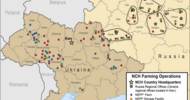Sudan Tribune | 10 March 2012
Khartoum — An agricultural project in the Nile River state in Sudan was put on hold because China cancelled a loan that was needed to extend electricity in the area, president Omer Hassan al-Bashir revealed.
In an interview with the Sunday edition of the Doha-based Al-Raya newspaper, Bashir said that his government gave Qatar 250,000 acres of land in the state to encourage investments from the rich Arab Gulf state.
"But the project stalled due to China not following through on its funding for the project of extending the electric grid because the Chinese loan was in return for oil shipments which stopped after the secession of the south" the Sudanese leader said.
"And so China stopped the financing [the project]" he added.
Bashir said the Qataris decided to step in and provide the loan after Beijing backtracked. "The ball is now in the court of our Qatari brothers".
The statements by Bashir provide a rare glimpse into the China-Sudan ties after the oil-rich south became an independent state last July. As a result of the breakup, the north was stripped of 75% of the oil reserves when the country was one.
Sudan's finance and national economy minister Ali Mahmood Abdel-Rasool said last month that China has extended the maturity of its debt for another five years upon Khartoum's request.
A few days before south's independence, Bashir paid a visit to China for talks with his counterpart Hu Jintao. According to Sudanese foreign minister Ali Karti at the time, the two countries signed an oil and gas exploration agreement and also received pledges of hundreds of millions of dollars in aid.
Karti said Khartoum also received Chinese assurances that they do not support the International Criminal Court (ICC) arrest warrant issued for the Sudanese leader and that they promised to seek to mend ties between Khartoum and the West.
"We are now in need of Chinese support because the West instead of supporting us is now doing what I can describe as a challenge" the Sudanese diplomat said.
Over the last decade, the Chinese government has given diplomatic backing to Khartoum at the United Nations Security Council (UNSC) particularly in face of western criticism for the alleged widespread atrocities in Sudan's western region of Darfur. China is also one of the top weapons suppliers of Sudan.
The Chinese government was motivated by a keenness to secure its multi-billion dollar investments in the East African nation particularly in the oil sector. Most of Sudan's oil exports went to energy-hungry China.
But Beijing's position is now precarious in light of the oil dispute between north and south Sudan.
Tensions escalated after Khartoum began late last year taking oil from the landlocked southern neighbor, which exports its crude through Sudan's pipelines to a port on the Red Sea. In retaliation, South Sudan shut down its entire oil production of 350,000 barrels a day.
China made one unsuccessful attempt last December to convince the two sides to reverse their unilateral decisions. Afterwards the Asian growing world power appeared to be mostly taking the "wait and see" approach while issuing statements urging Khartoum and Juba to settle their differences through negotiations.
The loss of billions of dollars in oil revenue led to a widening budget deficit for Sudan and a severe shortage in foreign currency causing a sharp weakening in the value of the pound.
Khartoum was hoping that Juba would agree to pay the $36 per barrel fee for transporting its oil which would help Sudan whither the impact of the secession.
However, the negotiations on this issue have failed to bring about a compromise as the south insists on paying around $1 per barrel.
The Sudanese president downplayed the effect of the oil shutdown saying that his country lost only 30% of its revenue sources while the south lost 98%.
"We expect oil production in the north to increase by at least 75,000 barrels a day this year. We also have another source which is gold and the indicators according to the [Central] Bank of Sudan that Sudan will produce 50 tonnes by year end which is valued at $2.5 billion at the minimum" Bashir said.
He added that they are also trying to boost cotton production which he said is seeing a big price increasing internationally and that Sudan will witness a surplus in cotton production along with sesame, sugar and beans.
"We have livestock and meat prices increased [along with] exports and profits are very huge in livestock," Bashir added.
The Sudanese president expressed optimism that his government will secure several loans to support the balance of payments and boasted that the country has not suffered from any shortage in basic commodities.
This week Qatar promised Sudan $2 billion in the form of treasury bills and investments in several sectors of the economy. Bashir also flew to Saudi Arabia on Friday in a visit that appeared to be aimed at getting more financial help from the oil-rich Arab state.
Khartoum — An agricultural project in the Nile River state in Sudan was put on hold because China cancelled a loan that was needed to extend electricity in the area, president Omer Hassan al-Bashir revealed.
In an interview with the Sunday edition of the Doha-based Al-Raya newspaper, Bashir said that his government gave Qatar 250,000 acres of land in the state to encourage investments from the rich Arab Gulf state.
"But the project stalled due to China not following through on its funding for the project of extending the electric grid because the Chinese loan was in return for oil shipments which stopped after the secession of the south" the Sudanese leader said.
"And so China stopped the financing [the project]" he added.
Bashir said the Qataris decided to step in and provide the loan after Beijing backtracked. "The ball is now in the court of our Qatari brothers".
The statements by Bashir provide a rare glimpse into the China-Sudan ties after the oil-rich south became an independent state last July. As a result of the breakup, the north was stripped of 75% of the oil reserves when the country was one.
Sudan's finance and national economy minister Ali Mahmood Abdel-Rasool said last month that China has extended the maturity of its debt for another five years upon Khartoum's request.
A few days before south's independence, Bashir paid a visit to China for talks with his counterpart Hu Jintao. According to Sudanese foreign minister Ali Karti at the time, the two countries signed an oil and gas exploration agreement and also received pledges of hundreds of millions of dollars in aid.
Karti said Khartoum also received Chinese assurances that they do not support the International Criminal Court (ICC) arrest warrant issued for the Sudanese leader and that they promised to seek to mend ties between Khartoum and the West.
"We are now in need of Chinese support because the West instead of supporting us is now doing what I can describe as a challenge" the Sudanese diplomat said.
Over the last decade, the Chinese government has given diplomatic backing to Khartoum at the United Nations Security Council (UNSC) particularly in face of western criticism for the alleged widespread atrocities in Sudan's western region of Darfur. China is also one of the top weapons suppliers of Sudan.
The Chinese government was motivated by a keenness to secure its multi-billion dollar investments in the East African nation particularly in the oil sector. Most of Sudan's oil exports went to energy-hungry China.
But Beijing's position is now precarious in light of the oil dispute between north and south Sudan.
Tensions escalated after Khartoum began late last year taking oil from the landlocked southern neighbor, which exports its crude through Sudan's pipelines to a port on the Red Sea. In retaliation, South Sudan shut down its entire oil production of 350,000 barrels a day.
China made one unsuccessful attempt last December to convince the two sides to reverse their unilateral decisions. Afterwards the Asian growing world power appeared to be mostly taking the "wait and see" approach while issuing statements urging Khartoum and Juba to settle their differences through negotiations.
The loss of billions of dollars in oil revenue led to a widening budget deficit for Sudan and a severe shortage in foreign currency causing a sharp weakening in the value of the pound.
Khartoum was hoping that Juba would agree to pay the $36 per barrel fee for transporting its oil which would help Sudan whither the impact of the secession.
However, the negotiations on this issue have failed to bring about a compromise as the south insists on paying around $1 per barrel.
The Sudanese president downplayed the effect of the oil shutdown saying that his country lost only 30% of its revenue sources while the south lost 98%.
"We expect oil production in the north to increase by at least 75,000 barrels a day this year. We also have another source which is gold and the indicators according to the [Central] Bank of Sudan that Sudan will produce 50 tonnes by year end which is valued at $2.5 billion at the minimum" Bashir said.
He added that they are also trying to boost cotton production which he said is seeing a big price increasing internationally and that Sudan will witness a surplus in cotton production along with sesame, sugar and beans.
"We have livestock and meat prices increased [along with] exports and profits are very huge in livestock," Bashir added.
The Sudanese president expressed optimism that his government will secure several loans to support the balance of payments and boasted that the country has not suffered from any shortage in basic commodities.
This week Qatar promised Sudan $2 billion in the form of treasury bills and investments in several sectors of the economy. Bashir also flew to Saudi Arabia on Friday in a visit that appeared to be aimed at getting more financial help from the oil-rich Arab state.












